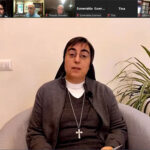 By Barb Arland-Fye
By Barb Arland-Fye
Messenger Editorial
War has been raging for nearly three decades in the eastern part of the Congo, ripping apart the fabric of family life. First-hand stories of the atrocities committed against women, men and children disturbed Pope Francis during his visit there last month. Rape, an especially horrific tool of war, has lasting effects far beyond the initial violence. As a Congolese refugee told The Catholic Messenger, rape brings shame and stigma to the survivors and to the children conceived in rape. Our voices need to speak out against this lethal tool of war, fueled by insatiable greed and a thirst for power.
All of us, sisters and brothers in Christ, have a role to play in fostering peace and ending this war and its devastating consequences. Women must be at the negotiating table if peace is to become a reality – in the Congo, in South Sudan, in Ukraine or other countries mired in war.
“Over the past few years, violence against women and girls has increased, while women’s representation in peace processes has declined, demonstrating that the current approach is falling short.” That observation is contained in a March 7 statement delivered to the UN Security Council on behalf of Archbishop Gabriele Caccia, permanent observer of the Holy See to the United Nations.
The Holy See’s statement referenced UN Security Council Resolution 1325, adopted 23 years ago, which “recognized the importance of women’s involvement in peace and security issues to achieving long lasting stability” (https://tinyurl.com/57evsvry). The statement also quoted Pope Francis in his January address to the Diplomatic Corps accredited to the Holy See. The Holy Father said, “when human rights are fully recognized for all, women can offer their unique contribution to the life of society and to be the first allies of peace.”
In “many countries, women are considered second-class citizens,” Pope Francis said, facing violence, abuse and limited access to education, employment, healthcare and other basic necessities. The statement said the Holy See deplores “the situation faced by many women and girls, who are systematically denied the benefit of education.”
During his apostolic journey to the Democratic Republic of the Congo and South Sudan, “Pope Francis highlighted the potential of women to transform violent societies into peaceful ones, when they ‘are protected, respected, valued and honored,’” the statement said. “To unlock this potential, this Council must ensure that women, especially ‘mothers who know how life is generated and safeguarded,’ receive opportunities to participate more fully in peace processes and in all facets of ‘political life and decision-making processes.’”
Here are ways we can help foster peace and restore the fabric of the family in the Congo:
- Read. Veve Nduhirahe, a Congolese refugee and member of St. Thomas More Parish in Coralville recommends “The Power of Women, A Doctor’s Journey of Hope and Healing,” by Dr. Denis Mukwege. He and the Mukwege Foundation are working “towards a world where sexual violence in conflict is no longer tolerated, where survivors have the freedom to speak out and be heard, and where they can receive the care and reparations they are entitled to” (mukwegefoundation.org/the-power-of-women/). Other reading sources: Women for Women International (https://tinyurl.com/2p94hfj6); UN Women Africa (https://tinyurl.com/4zjhzz38); Caritas Congo (https://tinyurl.com/3c62dcr4/); and the U.S. Agency for International Development (USAID) (https://tinyurl.com/477mk4e6).
- Advocate. Ask Congress to support robust funding for USAID in the next budget. Since 1960, when DRC gained independence, USAID has “partnered with the government and people to improve Congolese citizens’ quality of life, increase the effectiveness of national institutions, and strengthen the foundation for durable peace in eastern DRC” (https://tinyurl.com/477mk4e6).
- Support the education of women and girls. As Pope Francis has said, “Education is essential for fostering societies which treat women and men equally. This begins with the family, the ‘fundamental group unit of our society’” (March 9 statement of the Permanent Observer of the Holy See to the United Nations).
The World Bank Education Global Practice report on Improving Education Outcomes for Girls and Young Women is a place to learn more about what we can do.
- Pray. Our consistent prayers will help us to keep in mind the women and girls of the Congo, as well as their families, and strengthen our resolve to use our resources to provide them with the tools they need to end war and foster peace.
Barb Arland-Fye, Editor
arland-fye@davenportdiocese.org











